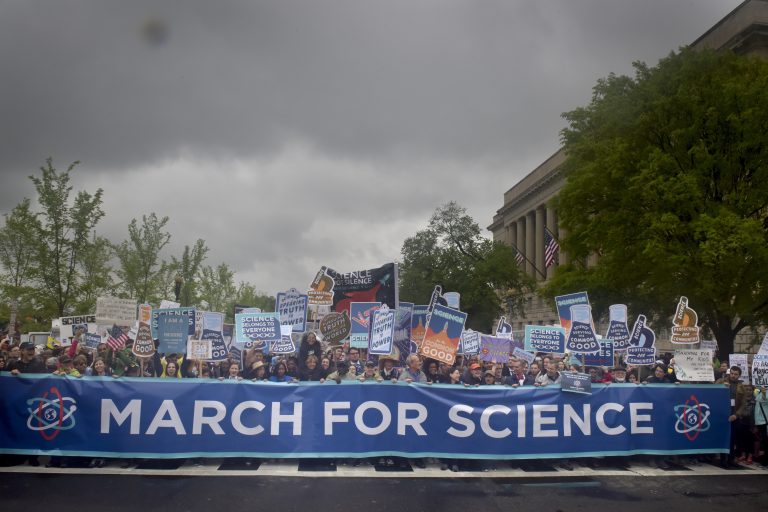
Feb 8, 2018
Getting scientists to become more politically involved has been an ongoing movement this year, with groups like the American Association for the Advancement of Science and American Chemical Society encouraging scientists to voice their opinions and even join protests, like the March for Science in April 2017.
Now, hundreds of scientists and STEM professionals are running for public office in 2018, for everything from Senate seats to a spot on the local school board.
“I’m not a politician, I’m a doctor,” reads the first line of Dr. Jason Westin‘s bio on his campaign website for Texas’s 7th congressional district seat. Westin, a cancer doctor based in Houston who is challenging Republican John Abney Culberson, decided to run for office after the results of the 2016 election. November 8 is his wife Shannon’s birthday, and that night she was wearing a pantsuit as the couple drank champagne, watching the results. When it became clear their candidate wasn’t going to win, the couple—both oncologists at MD Anderson Cancer Center in Houston—decided they needed to do more.
“We are at a crisis point, and we should have more scientists in office,” says Westin, who is running on a platform to defend science and facts, as well as to influence issues like health care access, science research, and women’s health.
“The scientific method is something that — if you’re trained in it — colors everything you look at,” he says. “It impacts your analysis of every situation. The issues that are important to me are things we thought deeply about. We analyzed the facts, which I do on a daily basis, but should be more widely done.”
Westin’s campaign video — where he declares “there’s a cancer eating away at America, that cancer, is ignorance” — has been widely shared, including by actor Mark Hamill who posted it to Twitter with the hashtag #MayTheFactsBeWithYouALL.
He’s joined by many others. Over 1,500 miles away, Dr. Mai Khanh Tran, a pediatrician in Orange County, Calif., is fighting one of the worst flu epidemics in the last decade. She’s also running a campaign to represent California’s 39th Congressional District in 2018. “I saw a patient this week whose family told me they couldn’t afford the Tamiflu I prescribed,” says Tran. “It’s more evidence that I should be at the table when it comes to health policy decisions.” (TIME recently mentioned Tran in a cover story on women running for office).
Nearby, Dr. Hans Keirstead, a stem cell researcher and CEO of AIVITA Biomedical, is running for Republican Dana Rohrabacher’s seat as representative of California’s 48th congressional district. Keirstead says he’s encouraged by the number of his science peers running for office. “It means I am going to have some motivated and logical colleagues in Congress,” he says. “I am just thrilled scientists are stepping forward.”
According to 314 Action, a pro-science advocacy organization group that helps STEM professionals run for public office (and is named for the first three numbers of pi), there are more than 60 people with science backgrounds running for federal positions, and 200 STEM state legislative candidates running as of Jan. 31. There are also 200 science-trained school board candidates. Westin, Tran and Keirstead are endorsed by the group, which means they are receiving donations from the organization.
“The attacks on science didn’t start with Trump,” says Shaughnessy Naughton, the founder of 314 Action. “But it has been a catalyst. What I hear from [scientists] is ‘I need to do something.’” Naughton, a chemist and breast cancer researcher, ran for Congress unsuccessfully in 2014 and 2016. Though she didn’t win the seat, Naughton gained support from a wide community of STEM professionals and used that community to build out 314 Action.
In January 2017, 314 Action announced that the organization would start offering trainings for STEM professionals interested in considering a run for public office. “I boldly thought we would have 1,000 people reach out,” says Naughton. “Instead we’ve had over 7,000 people in 12 months.” The group estimates about 1,500 people have gone through one of their trainings.
Naughton says she can point to several decisions made by President Donald Trump’s administration that have spurred widespread response from the medical and science community. She names the decision to withdraw from the Paris Agreement on climate change, the confirmation of Scott Pruitt—who has a history of questioning the scientific consensus of climate change—as administrator of the Environmental Protection Agency (EPA), and the decision to withdraw federal funding for epidemic response and research.
“We’ve heard from physicians concerned about health care, technologists concerned about cyber security, stem cell researchers who know the importance of federal investment in early research,” says Naughton. “There’s a laundry list of outrages.”
Scientists have been elected to public office before, but it’s not common. 314 Action provides trainings for people unfamiliar with the political process, and helps candidates put together finance and communications strategies. The organization also considers candidates for endorsements. If a candidate is endorsed by the group, 314 Action donates to their campaign and introduces the candidate to the organization’s donor network. So far the group has endorsed 11 new candidates, and reports that it is on track to raise between $5-$7 million for the 2018 election cycle.
“Scientists have to get beyond this notion that because science is above politics, that scientists cannot be in politics,” says Naughton. “The reverse is happening — politicians are inserting themselves into science and it’s not good.”
Tran says she thinks the number of STEM professionals running for office in 2018 marks a “historic moment.”
“We are leaving our labs and offices,” she says. “I am so encouraged by it.”










